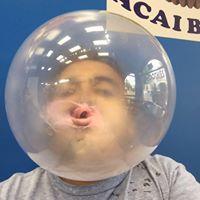-
Posts
125 -
Joined
-
Last visited
Reputation Activity
-
 Quantitative_Psychology got a reaction from HaveNotDecidedDisplayName in TA Research Methods Problem Student and Professor
Quantitative_Psychology got a reaction from HaveNotDecidedDisplayName in TA Research Methods Problem Student and Professor
@cowgirlsdontcry You're on point about grading too hard on APA style. As much as I personally dislike it, at least half of the points for assignments are APA formatting. My rubric states I need to take off 1 point per mistake. Students, of course, find it very unfair, but I can't change the rubric a professor gives me. I think it has to do with the class being Research Methods. So the point is for students to understand the writing style standard in the psychology field.
-
 Quantitative_Psychology got a reaction from TwirlingBlades in Quitting a TA position for a Research postion
Quantitative_Psychology got a reaction from TwirlingBlades in Quitting a TA position for a Research postion
Thank you both for your thoughtful advice. I really appreciated your fresh perspective. No one else is spoken to presented suggestions quite so well. If anyone is curious about how it turned out, I am pleased to share.
I did ask my advisor about the situation, and she too voiced a concern that the coordinating professor for the teaching position might be offended if I asked to quit in the Spring for a research position. My advisor especially noted that as a coauthor I needed to be extra careful in handling this. However, she instructed me to speak with the coordinating professor immediately and be upfront in assuring said professor that if it inconvenienced or upset her that I would absolutely turn down the research position with no questions asked.
I was extremely nervous walking into that conversation, but turned out my worries were not warranted. The coordinating professor did find the request odd and told me that typically this is a year commitment and she would hold me to it. However, the circumstances just so happen to be that the 5 positions teaching positions that we currently have for the fall are not all needed for the Spring. In fact, the department only need 4. Despite only needing 4, the department was trying to make 5 positions for the Spring just to ensure no one loses funding. Therefore, the coordinating professor was happy to release from the teaching position into the research position. It actually worked better for everyone involved.
I am aware that I lucked out in this case this situation could have gone badly. However, I also wish I'd been more secure and less worried about having the conversation with her. The coordinating professor and I are very close, and I honestly don't think she would have held it over my head for simply asking had it not been possible.
-
 Quantitative_Psychology reacted to rising_star in Furnishing an Apartment on a Budget?
Quantitative_Psychology reacted to rising_star in Furnishing an Apartment on a Budget?
I would not go cheap on the mattress. In theory, you spend a third of your life in bed. Having a comfortable mattress which doesn't leave you in pain is a crucial investment in your success as a graduate student. My advice is not to look at the brands or names or whatever (google all the BS around mattress marketing to understand why) and instead give them a test in the store. Lay on each one you find somewhat comfortable for at least 10 minutes and in the positions you normally sleep in. If it isn't 100% comfortable, move on and try another. When you find one or two you love, then compare price and pick the affordable one. But, do NOT go cheap on the mattress.
-
 Quantitative_Psychology reacted to orange turtle in Furnishing an Apartment on a Budget?
Quantitative_Psychology reacted to orange turtle in Furnishing an Apartment on a Budget?
I know money is a problem (it is for me, too!) but want to say if at all possible, consider buying a good mattress (and if possible, new). You don't need a bed, really. If u want it raised, get a cheap bottom frame.
A good mattress has been my life saver. Grad school is tiring and you don't want to come home and go to a crappy bed.
If you are really on a budget, buy a used mattress and buy a good mattress topper.
Your body (and mind!) will thank you.
P.s., look and see if your school has a student forum to sell, buy, and / or trade stuff. Mine has a forum that allows students to post stuff (like housing request).
-
 Quantitative_Psychology got a reaction from SA13 in Calling all Texas State and Lamar University graduate students!
Quantitative_Psychology got a reaction from SA13 in Calling all Texas State and Lamar University graduate students!
I am not a speech-language pathology graduate student at Texas State, but I am a current graduate student there (M.A. Psychological Research). So I should be able to speak a bit on the cost of living in San Marcos, TX and what the vibe of the area is like for graduate students. Let me know if you have any questions in that realm.
As far as research opportunity goes, Texas State is really ramping up its research because it wants to be an R1. This means they are very giving towards their graduate students when it comes to funding research projects and going to conferences. I've easily been able to go to two out of state conferences a year with all my expenses covered. I'm not sure what Lamar offers, but I would say Texas State is definitely enthusiastic about research with graduate students.
-
 Quantitative_Psychology reacted to fr0sting in Has anyone heard from Berkeley?
Quantitative_Psychology reacted to fr0sting in Has anyone heard from Berkeley?
Yes - got the formal acceptance already !
-
 Quantitative_Psychology reacted to cupofsugar in Fall 2018 Quantitative Psychology PhD Applicants
Quantitative_Psychology reacted to cupofsugar in Fall 2018 Quantitative Psychology PhD Applicants
I’m still waiting.
-
 Quantitative_Psychology reacted to Jason2018 in Fall 2018 Quantitative Psychology PhD Applicants
Quantitative_Psychology reacted to Jason2018 in Fall 2018 Quantitative Psychology PhD Applicants
That is good! No need to feel guilty, multiple acceptances means that you are hot on the market.
And I have decided to go to Penn State for a social psych program. So not in the running for QM programs now. Wish everyone best of luck!
-
 Quantitative_Psychology reacted to JustSad in Fall 2018 Psych PhD Interviews (not clinical)
Quantitative_Psychology reacted to JustSad in Fall 2018 Psych PhD Interviews (not clinical)
Have the same question regarding the 'social' area. Last few years' result updates weren't very clarifying either.
-
 Quantitative_Psychology got a reaction from VulpesZerda in Conference posters: good pursuit or not?
Quantitative_Psychology got a reaction from VulpesZerda in Conference posters: good pursuit or not?
From speaking with my advisor previously on the topic, I would say it isn't expected that a 3rd year Ph.D. student would have talks under his or her belt. However, you might want to keep an eye out for the next two years for talk opportunities because it is more expected in the later years of graduate school.
Personally, I like to focus more on publications instead of posters. On the other hand, if you've done the work and it isn't in the shape for a publication, it is good to have something to show for it. In my opinion, posters are better than nothing, but publications are vital. I don't know that posters will have much sway in getting a tenured position or post-doc, but they must look better than a blank CV for three years.
-
 Quantitative_Psychology got a reaction from wnk4242 in Interview Questions/ Answers
Quantitative_Psychology got a reaction from wnk4242 in Interview Questions/ Answers
I would note that perhaps the best interview I had with someone outside of my POI was when I was able to ask the professor to tell me more about his research in XXXX area using XXXX model. He got really excited that I wanted to talk about this model he had designed with one of his graduate students (he pulled out slides from his computer and everything), and I got to participate in a conversation with way less pressure. We even got to theorize on different directions the research could go and different applications of the model. It pays to know enough to ask one of the questions, but you don't need to know everything. In fact, you may only need to know one thing (e.g., he may be interested in and publish in XXX1, XXX2, XXX3, and XXXX4, but I ask/talk about XXX3).
-
 Quantitative_Psychology got a reaction from Piagetsky in Conference posters: good pursuit or not?
Quantitative_Psychology got a reaction from Piagetsky in Conference posters: good pursuit or not?
From speaking with my advisor previously on the topic, I would say it isn't expected that a 3rd year Ph.D. student would have talks under his or her belt. However, you might want to keep an eye out for the next two years for talk opportunities because it is more expected in the later years of graduate school.
Personally, I like to focus more on publications instead of posters. On the other hand, if you've done the work and it isn't in the shape for a publication, it is good to have something to show for it. In my opinion, posters are better than nothing, but publications are vital. I don't know that posters will have much sway in getting a tenured position or post-doc, but they must look better than a blank CV for three years.
-
 Quantitative_Psychology reacted to vallaboop in PhD Fall 2018 Applicants
Quantitative_Psychology reacted to vallaboop in PhD Fall 2018 Applicants
Just accidentally sent a work email to one of my POIs... *face palm*
-
 Quantitative_Psychology got a reaction from letstrythiswinston in Fall 2018 Quantitative Psychology PhD Applicants
Quantitative_Psychology got a reaction from letstrythiswinston in Fall 2018 Quantitative Psychology PhD Applicants
Boston was great! It was actually what got me interested in quantitative psychology.
-
 Quantitative_Psychology reacted to letstrythiswinston in Fall 2018 Quantitative Psychology PhD Applicants
Quantitative_Psychology reacted to letstrythiswinston in Fall 2018 Quantitative Psychology PhD Applicants
Yep! I enjoyed it a lot last year, so I think this year'll be pretty fun
-
 Quantitative_Psychology got a reaction from wnk4242 in How to Deal with Rejection
Quantitative_Psychology got a reaction from wnk4242 in How to Deal with Rejection
Two years ago, I applied to 8 clinical programs, and I didn't hear a word from a single one until I got my official rejection in the mail. Some of what I have ot say is advice, but I also find just writing about it be a bit cathartic.
Self-Care
I'll admit my self-care following my rejections sucked...like really bad. I gained some weight and trended towards depression. I pretty much had no motivation to do anything for a few months. Didn't really go out with friends, let my school work go, and kept to myself. Perhaps what made the whole thing worse was that none of my friends or classmates or even my parents really knew what I was going through. Mostly, I regretted a lot of my choice during my undergrad and blamed myself for how things turned out. This isn't very fair to yourself though; you're young and you're going to make mistakes. Things improved for me when I started my Masters and a lot of my cohort were also Ph.D. program rejects. Then at least I could talk to other people about what I'm going through. I wish I could offer better self-care advice. All I can say is don't do what I did.
Motivation
Once I got myself more under control (several months later), motivation wasn't too big of a problem. One of the biggest motivators I've ever had is to make sure that this never happens to me again. While other people in my Master's program decided they wouldn't take the GRE again prior to applying to Ph.D. programs, I was motivated to not take that risk. Also, I was highly motivated to seek out opportunities to get publications, and I was motivated to do well in my graduate classes. Just let your rejection be a motivating force. It can really drive you.
What Now
A lot of people suggest reaching out to the programs you were rejected from and perhaps asking for feedback. I didn't do this. However, I did take a long, hard look at my application once I got back on my feet. *You don't need to do this immediately after rejection. You can practice self-care first*
Being critical and realistic about your application is one of the most important things you can do after a bad application season. A few things became clear to me. 1) My undergrad GPA was below average for all programs, 2) My GRE scores were below average, 3) My research experience wasn't enough at that point in time (only a year of experience), 4) My SOP sucked (everyone always assumes they wrote a great SOP. Have you noticed that? Looking back, I cringe at mine).
There were two obvious options of where to go from there. First, I could join a lab for a year and try again next year. Second, I could do a terminal Masters. My reasoning in picking the second option was that I had three big issues in my application, and I needed some extra help from a Masters. Ultimately, this has shown to be a good choice, but I often recommend people to just join a lab for a year if all they lack is research experience.
If you do end up doing a Masters, I highly recommend doing research outside of your thesis. A lot of people in my program just focused on doing their thesis and did not join other labs. This is extremely wasteful because your thesis won't be far enough along to discuss with your POI by the time you apply in your second year. Plus joining other labs lets you potentially get publications and posters and opens you up to other areas of research.
I took the GRE again, and I had some big improvements. If you have a less than stellar GPA, I really do recommend spending the time and taking the GRE again. Your scores don't have to be amazing, but don't let them be below average.
Other Notes
"Everything happens for a reason" is a really sucky quote. However, I would acknowledge that I am glad I didn't get into a Clinical Program. During my Masters, I discovered Quantitative Psychology, and I realized that I really wouldn't have been happy in a Clinical program. In that sense, I think I really benefited from not getting into a Ph.D. program on my first try. It can be beneficial to regroup and realize that maybe what you thought you wanted to do isn't actually what you want to do.
-
 Quantitative_Psychology got a reaction from wnk4242 in Fall 2018 Quantitative Psychology PhD Applicants
Quantitative_Psychology got a reaction from wnk4242 in Fall 2018 Quantitative Psychology PhD Applicants
Had my first Skype interview today. I think it went pretty well. It was very sudden. Didn’t have much time to prepare
Congrats! That’s awesome ?
-
 Quantitative_Psychology reacted to wnk4242 in Fall 2018 Quantitative Psychology PhD Applicants
Quantitative_Psychology reacted to wnk4242 in Fall 2018 Quantitative Psychology PhD Applicants
Finally, I have been officially admitted to FSU measurement and statistics program. Yay!
-
 Quantitative_Psychology reacted to sc9an in Rescheduled Campus Visit Invitation, Conditional on Whether the Program is My Top Choice
Quantitative_Psychology reacted to sc9an in Rescheduled Campus Visit Invitation, Conditional on Whether the Program is My Top Choice
I thought this would be an interesting case to share. Please feel free to share any comments or suggestions.
Background. I had a pre-interview phone call with a POI over the weekend. I learned a lot about his research and the program, and he agreed that our interests and goals are a good match.
Case. POI invited me to a campus visit and interview, but the date conflicted with another interview visit I committed to last month. I checked the gradcafe forum, learned that this is not uncommon, and requested a rescheduling of the visit. POI replied with something like "not sure" and "if you found that you liked the program after the visit, would it be your first choice?" POI then said if that is not the case the visit would not be "worth it."
Response. I recognize that asking for a rescheduled visit is only a request of mine, and that it is not unreasonable to deny this request given certain constraints of the university. I acknowledged this in the email response I drafted and also admitted that it is too early for me to assert whether the program is my top choice. (It was not when I first made the school list...) And then I said I would respect any decisions or suggestions POI would make regarding my visit.
I have not sent the email yet. It would be great if I could receive some thoughts from the forum regarding how properly I handled the situation. While I know I was the one who's giving them a hard time, it just stood out to me that the POI would try to "game" the visit, or is it just my overthinking?
-
 Quantitative_Psychology reacted to sc9an in Rescheduled Campus Visit Invitation, Conditional on Whether the Program is My Top Choice
Quantitative_Psychology reacted to sc9an in Rescheduled Campus Visit Invitation, Conditional on Whether the Program is My Top Choice
Hey this is OP. Huge thanks to everyone who shared his/her thoughts under this thread! The discussion here is very informative and helpful to me. There are too many posts to reply at the moment, but I've liked all the comments!
I agree that the question POI raised could have been quite stressful, by asking about a preference that has big implication but not enough information to support yet. On the other hand it is completely reasonable that POI would want to improve his return on investment (offer acceptance rate), and as an applicant in the process it is better off for me to unequivocally provide that information.
I have not sent out my email @TakeruK. I realized that it has to be more decisive and reflecting my situation. I will have to revise it based on the suggestions many of you gave here. Many thanks again!
Edit: I just want to give "like" to posts as a token of "thanks for sharing", as people are helping to advise on my situation. I can't seem to like posts more than a certain times a day, but I will do it over the next few days. If this is not fine, Moderator please feel free to let me know.
-
 Quantitative_Psychology got a reaction from meghan_paleoclimate in What's your craziest backup plan?
Quantitative_Psychology got a reaction from meghan_paleoclimate in What's your craziest backup plan?
Two words: stripper psychologist...maybe not my best plan.
-
 Quantitative_Psychology got a reaction from CarlosS91 in What's your craziest backup plan?
Quantitative_Psychology got a reaction from CarlosS91 in What's your craziest backup plan?
Two words: stripper psychologist...maybe not my best plan.
-
 Quantitative_Psychology got a reaction from H1ppocampus in How to Deal with Rejection
Quantitative_Psychology got a reaction from H1ppocampus in How to Deal with Rejection
Two years ago, I applied to 8 clinical programs, and I didn't hear a word from a single one until I got my official rejection in the mail. Some of what I have ot say is advice, but I also find just writing about it be a bit cathartic.
Self-Care
I'll admit my self-care following my rejections sucked...like really bad. I gained some weight and trended towards depression. I pretty much had no motivation to do anything for a few months. Didn't really go out with friends, let my school work go, and kept to myself. Perhaps what made the whole thing worse was that none of my friends or classmates or even my parents really knew what I was going through. Mostly, I regretted a lot of my choice during my undergrad and blamed myself for how things turned out. This isn't very fair to yourself though; you're young and you're going to make mistakes. Things improved for me when I started my Masters and a lot of my cohort were also Ph.D. program rejects. Then at least I could talk to other people about what I'm going through. I wish I could offer better self-care advice. All I can say is don't do what I did.
Motivation
Once I got myself more under control (several months later), motivation wasn't too big of a problem. One of the biggest motivators I've ever had is to make sure that this never happens to me again. While other people in my Master's program decided they wouldn't take the GRE again prior to applying to Ph.D. programs, I was motivated to not take that risk. Also, I was highly motivated to seek out opportunities to get publications, and I was motivated to do well in my graduate classes. Just let your rejection be a motivating force. It can really drive you.
What Now
A lot of people suggest reaching out to the programs you were rejected from and perhaps asking for feedback. I didn't do this. However, I did take a long, hard look at my application once I got back on my feet. *You don't need to do this immediately after rejection. You can practice self-care first*
Being critical and realistic about your application is one of the most important things you can do after a bad application season. A few things became clear to me. 1) My undergrad GPA was below average for all programs, 2) My GRE scores were below average, 3) My research experience wasn't enough at that point in time (only a year of experience), 4) My SOP sucked (everyone always assumes they wrote a great SOP. Have you noticed that? Looking back, I cringe at mine).
There were two obvious options of where to go from there. First, I could join a lab for a year and try again next year. Second, I could do a terminal Masters. My reasoning in picking the second option was that I had three big issues in my application, and I needed some extra help from a Masters. Ultimately, this has shown to be a good choice, but I often recommend people to just join a lab for a year if all they lack is research experience.
If you do end up doing a Masters, I highly recommend doing research outside of your thesis. A lot of people in my program just focused on doing their thesis and did not join other labs. This is extremely wasteful because your thesis won't be far enough along to discuss with your POI by the time you apply in your second year. Plus joining other labs lets you potentially get publications and posters and opens you up to other areas of research.
I took the GRE again, and I had some big improvements. If you have a less than stellar GPA, I really do recommend spending the time and taking the GRE again. Your scores don't have to be amazing, but don't let them be below average.
Other Notes
"Everything happens for a reason" is a really sucky quote. However, I would acknowledge that I am glad I didn't get into a Clinical Program. During my Masters, I discovered Quantitative Psychology, and I realized that I really wouldn't have been happy in a Clinical program. In that sense, I think I really benefited from not getting into a Ph.D. program on my first try. It can be beneficial to regroup and realize that maybe what you thought you wanted to do isn't actually what you want to do.
-
 Quantitative_Psychology got a reaction from 01sonal in How to Deal with Rejection
Quantitative_Psychology got a reaction from 01sonal in How to Deal with Rejection
Two years ago, I applied to 8 clinical programs, and I didn't hear a word from a single one until I got my official rejection in the mail. Some of what I have ot say is advice, but I also find just writing about it be a bit cathartic.
Self-Care
I'll admit my self-care following my rejections sucked...like really bad. I gained some weight and trended towards depression. I pretty much had no motivation to do anything for a few months. Didn't really go out with friends, let my school work go, and kept to myself. Perhaps what made the whole thing worse was that none of my friends or classmates or even my parents really knew what I was going through. Mostly, I regretted a lot of my choice during my undergrad and blamed myself for how things turned out. This isn't very fair to yourself though; you're young and you're going to make mistakes. Things improved for me when I started my Masters and a lot of my cohort were also Ph.D. program rejects. Then at least I could talk to other people about what I'm going through. I wish I could offer better self-care advice. All I can say is don't do what I did.
Motivation
Once I got myself more under control (several months later), motivation wasn't too big of a problem. One of the biggest motivators I've ever had is to make sure that this never happens to me again. While other people in my Master's program decided they wouldn't take the GRE again prior to applying to Ph.D. programs, I was motivated to not take that risk. Also, I was highly motivated to seek out opportunities to get publications, and I was motivated to do well in my graduate classes. Just let your rejection be a motivating force. It can really drive you.
What Now
A lot of people suggest reaching out to the programs you were rejected from and perhaps asking for feedback. I didn't do this. However, I did take a long, hard look at my application once I got back on my feet. *You don't need to do this immediately after rejection. You can practice self-care first*
Being critical and realistic about your application is one of the most important things you can do after a bad application season. A few things became clear to me. 1) My undergrad GPA was below average for all programs, 2) My GRE scores were below average, 3) My research experience wasn't enough at that point in time (only a year of experience), 4) My SOP sucked (everyone always assumes they wrote a great SOP. Have you noticed that? Looking back, I cringe at mine).
There were two obvious options of where to go from there. First, I could join a lab for a year and try again next year. Second, I could do a terminal Masters. My reasoning in picking the second option was that I had three big issues in my application, and I needed some extra help from a Masters. Ultimately, this has shown to be a good choice, but I often recommend people to just join a lab for a year if all they lack is research experience.
If you do end up doing a Masters, I highly recommend doing research outside of your thesis. A lot of people in my program just focused on doing their thesis and did not join other labs. This is extremely wasteful because your thesis won't be far enough along to discuss with your POI by the time you apply in your second year. Plus joining other labs lets you potentially get publications and posters and opens you up to other areas of research.
I took the GRE again, and I had some big improvements. If you have a less than stellar GPA, I really do recommend spending the time and taking the GRE again. Your scores don't have to be amazing, but don't let them be below average.
Other Notes
"Everything happens for a reason" is a really sucky quote. However, I would acknowledge that I am glad I didn't get into a Clinical Program. During my Masters, I discovered Quantitative Psychology, and I realized that I really wouldn't have been happy in a Clinical program. In that sense, I think I really benefited from not getting into a Ph.D. program on my first try. It can be beneficial to regroup and realize that maybe what you thought you wanted to do isn't actually what you want to do.
-
 Quantitative_Psychology got a reaction from Left Skew in How to Deal with Rejection
Quantitative_Psychology got a reaction from Left Skew in How to Deal with Rejection
Two years ago, I applied to 8 clinical programs, and I didn't hear a word from a single one until I got my official rejection in the mail. Some of what I have ot say is advice, but I also find just writing about it be a bit cathartic.
Self-Care
I'll admit my self-care following my rejections sucked...like really bad. I gained some weight and trended towards depression. I pretty much had no motivation to do anything for a few months. Didn't really go out with friends, let my school work go, and kept to myself. Perhaps what made the whole thing worse was that none of my friends or classmates or even my parents really knew what I was going through. Mostly, I regretted a lot of my choice during my undergrad and blamed myself for how things turned out. This isn't very fair to yourself though; you're young and you're going to make mistakes. Things improved for me when I started my Masters and a lot of my cohort were also Ph.D. program rejects. Then at least I could talk to other people about what I'm going through. I wish I could offer better self-care advice. All I can say is don't do what I did.
Motivation
Once I got myself more under control (several months later), motivation wasn't too big of a problem. One of the biggest motivators I've ever had is to make sure that this never happens to me again. While other people in my Master's program decided they wouldn't take the GRE again prior to applying to Ph.D. programs, I was motivated to not take that risk. Also, I was highly motivated to seek out opportunities to get publications, and I was motivated to do well in my graduate classes. Just let your rejection be a motivating force. It can really drive you.
What Now
A lot of people suggest reaching out to the programs you were rejected from and perhaps asking for feedback. I didn't do this. However, I did take a long, hard look at my application once I got back on my feet. *You don't need to do this immediately after rejection. You can practice self-care first*
Being critical and realistic about your application is one of the most important things you can do after a bad application season. A few things became clear to me. 1) My undergrad GPA was below average for all programs, 2) My GRE scores were below average, 3) My research experience wasn't enough at that point in time (only a year of experience), 4) My SOP sucked (everyone always assumes they wrote a great SOP. Have you noticed that? Looking back, I cringe at mine).
There were two obvious options of where to go from there. First, I could join a lab for a year and try again next year. Second, I could do a terminal Masters. My reasoning in picking the second option was that I had three big issues in my application, and I needed some extra help from a Masters. Ultimately, this has shown to be a good choice, but I often recommend people to just join a lab for a year if all they lack is research experience.
If you do end up doing a Masters, I highly recommend doing research outside of your thesis. A lot of people in my program just focused on doing their thesis and did not join other labs. This is extremely wasteful because your thesis won't be far enough along to discuss with your POI by the time you apply in your second year. Plus joining other labs lets you potentially get publications and posters and opens you up to other areas of research.
I took the GRE again, and I had some big improvements. If you have a less than stellar GPA, I really do recommend spending the time and taking the GRE again. Your scores don't have to be amazing, but don't let them be below average.
Other Notes
"Everything happens for a reason" is a really sucky quote. However, I would acknowledge that I am glad I didn't get into a Clinical Program. During my Masters, I discovered Quantitative Psychology, and I realized that I really wouldn't have been happy in a Clinical program. In that sense, I think I really benefited from not getting into a Ph.D. program on my first try. It can be beneficial to regroup and realize that maybe what you thought you wanted to do isn't actually what you want to do.









